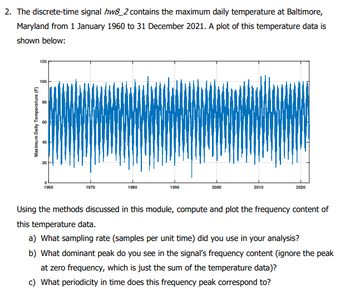2. The discrete-time signal hw8_2 contains the average daily temperature at Washington, D.C. from January 1, 1995, to May 13, 2020. A plot of this temperature data is shown below: 100 90 80 70 30 20 10 01/01/95 01/01/96 01/01/97 01/01/98 01/01/00 01/01/99 01/01/01 01/01/02 01/01/04 01/01/03 01/01/05 01/01/06 01/01/07 01/01/08 date 01/01/09 01/01/10 01/01/11 01/01/12 01/01/13 01/01/15 01/01/14 01/01/16 01/01/18 01/01/17 01/01/19 01/01/20 01/01/21 Using the methods discussed in this module, compute and plot the frequency content of this temperature data, and then answer the following questions. a) What dominant peak do you see in the signal's frequency content (ignore the pea at zero frequency, which is just the sum of the temperature data)? b) What periodicity in time does this frequency peak correspond to? c) What sampling rate (samples per unit time) did you use in your analysis?
2. The discrete-time signal hw8_2 contains the average daily temperature at Washington, D.C. from January 1, 1995, to May 13, 2020. A plot of this temperature data is shown below: 100 90 80 70 30 20 10 01/01/95 01/01/96 01/01/97 01/01/98 01/01/00 01/01/99 01/01/01 01/01/02 01/01/04 01/01/03 01/01/05 01/01/06 01/01/07 01/01/08 date 01/01/09 01/01/10 01/01/11 01/01/12 01/01/13 01/01/15 01/01/14 01/01/16 01/01/18 01/01/17 01/01/19 01/01/20 01/01/21 Using the methods discussed in this module, compute and plot the frequency content of this temperature data, and then answer the following questions. a) What dominant peak do you see in the signal's frequency content (ignore the pea at zero frequency, which is just the sum of the temperature data)? b) What periodicity in time does this frequency peak correspond to? c) What sampling rate (samples per unit time) did you use in your analysis?
Introductory Circuit Analysis (13th Edition)
13th Edition
ISBN:9780133923605
Author:Robert L. Boylestad
Publisher:Robert L. Boylestad
Chapter1: Introduction
Section: Chapter Questions
Problem 1P: Visit your local library (at school or home) and describe the extent to which it provides literature...
Related questions
Question

Transcribed Image Text:2. The discrete-time signal hw8_2 contains the average daily temperature at Washington,
D.C. from January 1, 1995, to May 13, 2020. A plot of this temperature data is shown
below:
temp (degrees F)
100
90
80
8
70
40
30
20
10
01/01/95
01/01/97
01/01/96
01/01/98
01/01/99
01/01/00
01/01/02
01/01/01
01/01/03
01/01/04
01/01/05
01/01/06
01/01/07
01/01/09
01/01/08
date
01/01/11
01/01/10
01/01/12
01/01/14
01/01/13
01/01/15
01/01/16
01/01/17
01/01/18
01/01/19
01/01/20
01/01/21
Using the methods discussed in this module, compute and plot the frequency content of
this temperature data, and then answer the following questions.
a) What dominant peak do you see in the signal's frequency content (ignore the peak
at zero frequency, which is just the sum of the temperature data)?
b) What periodicity in time does this frequency peak correspond to?
c) What sampling rate (samples per unit time) did you use in your analysis?
Expert Solution
This question has been solved!
Explore an expertly crafted, step-by-step solution for a thorough understanding of key concepts.
This is a popular solution!
Trending now
This is a popular solution!
Step by step
Solved in 3 steps

Follow-up Questions
Read through expert solutions to related follow-up questions below.
Follow-up Question

Transcribed Image Text:2. The discrete-time signal hw8_2 contains the maximum daily temperature at Baltimore,
Maryland from 1 January 1960 to 31 December 2021. A plot of this temperature data is
shown below:
Maximum Daily Temperature (F)
120
100
80
R
20
1960
1970
1980
1990
2000
2010
2020
Using the methods discussed in this module, compute and plot the frequency content of
this temperature data.
a) What sampling rate (samples per unit time) did you use in your analysis?
b) What dominant peak do you see in the signal's frequency content (ignore the peak
at zero frequency, which is just the sum of the temperature data)?
c) What periodicity in time does this frequency peak correspond to?
Solution
Knowledge Booster
Learn more about
Need a deep-dive on the concept behind this application? Look no further. Learn more about this topic, electrical-engineering and related others by exploring similar questions and additional content below.Recommended textbooks for you

Introductory Circuit Analysis (13th Edition)
Electrical Engineering
ISBN:
9780133923605
Author:
Robert L. Boylestad
Publisher:
PEARSON

Delmar's Standard Textbook Of Electricity
Electrical Engineering
ISBN:
9781337900348
Author:
Stephen L. Herman
Publisher:
Cengage Learning

Programmable Logic Controllers
Electrical Engineering
ISBN:
9780073373843
Author:
Frank D. Petruzella
Publisher:
McGraw-Hill Education

Introductory Circuit Analysis (13th Edition)
Electrical Engineering
ISBN:
9780133923605
Author:
Robert L. Boylestad
Publisher:
PEARSON

Delmar's Standard Textbook Of Electricity
Electrical Engineering
ISBN:
9781337900348
Author:
Stephen L. Herman
Publisher:
Cengage Learning

Programmable Logic Controllers
Electrical Engineering
ISBN:
9780073373843
Author:
Frank D. Petruzella
Publisher:
McGraw-Hill Education

Fundamentals of Electric Circuits
Electrical Engineering
ISBN:
9780078028229
Author:
Charles K Alexander, Matthew Sadiku
Publisher:
McGraw-Hill Education

Electric Circuits. (11th Edition)
Electrical Engineering
ISBN:
9780134746968
Author:
James W. Nilsson, Susan Riedel
Publisher:
PEARSON

Engineering Electromagnetics
Electrical Engineering
ISBN:
9780078028151
Author:
Hayt, William H. (william Hart), Jr, BUCK, John A.
Publisher:
Mcgraw-hill Education,